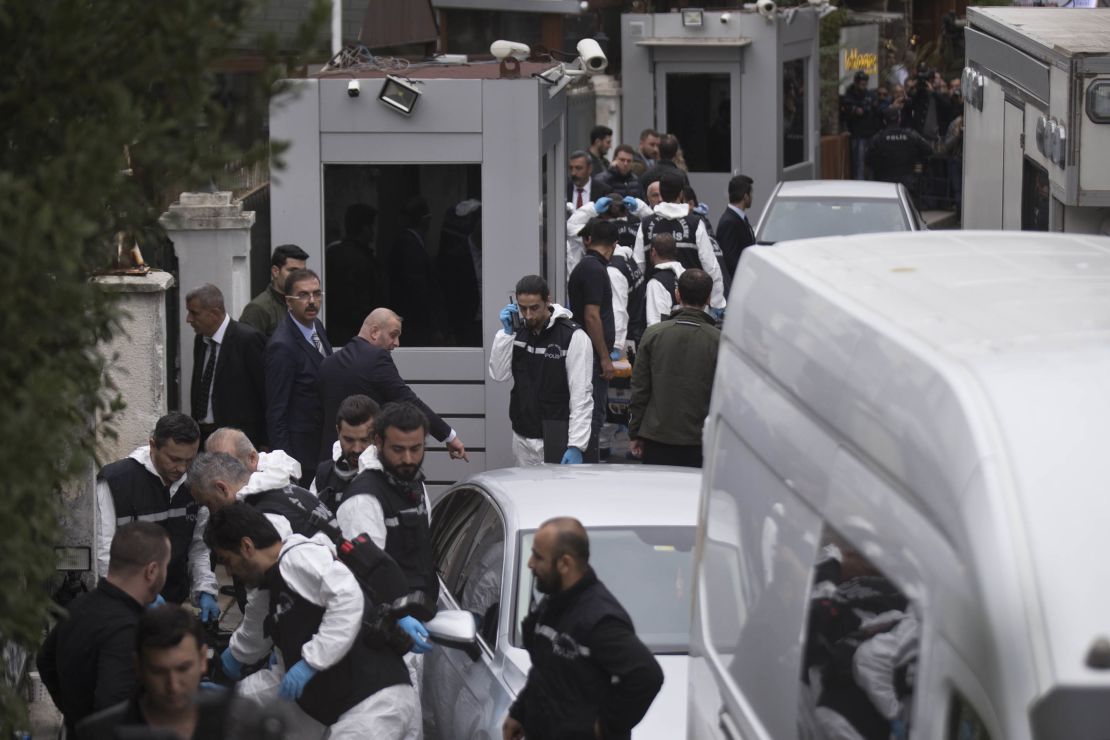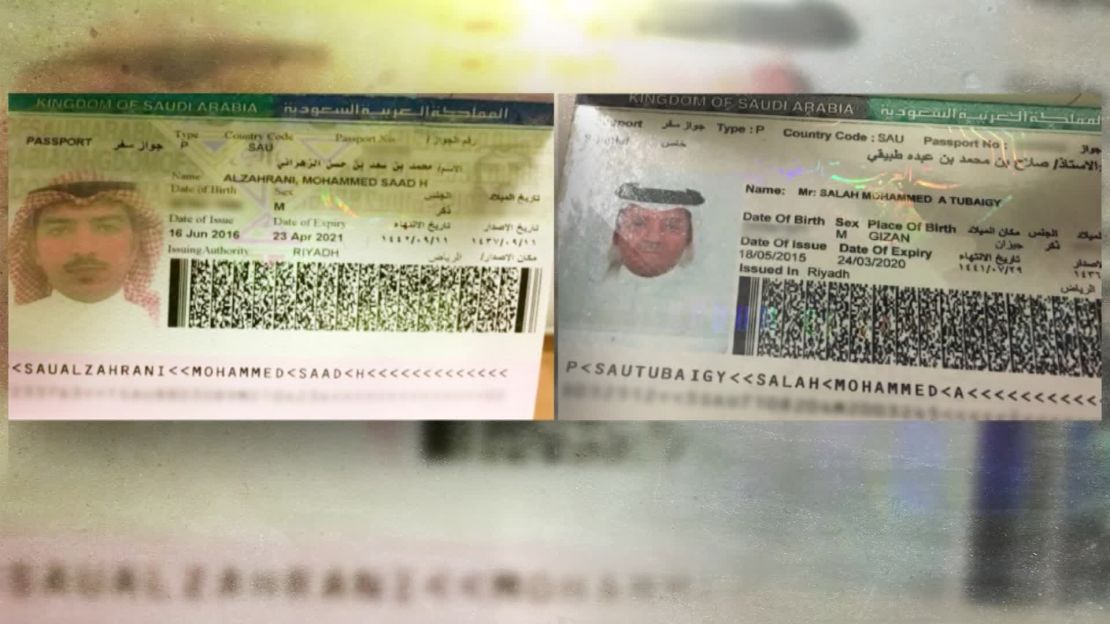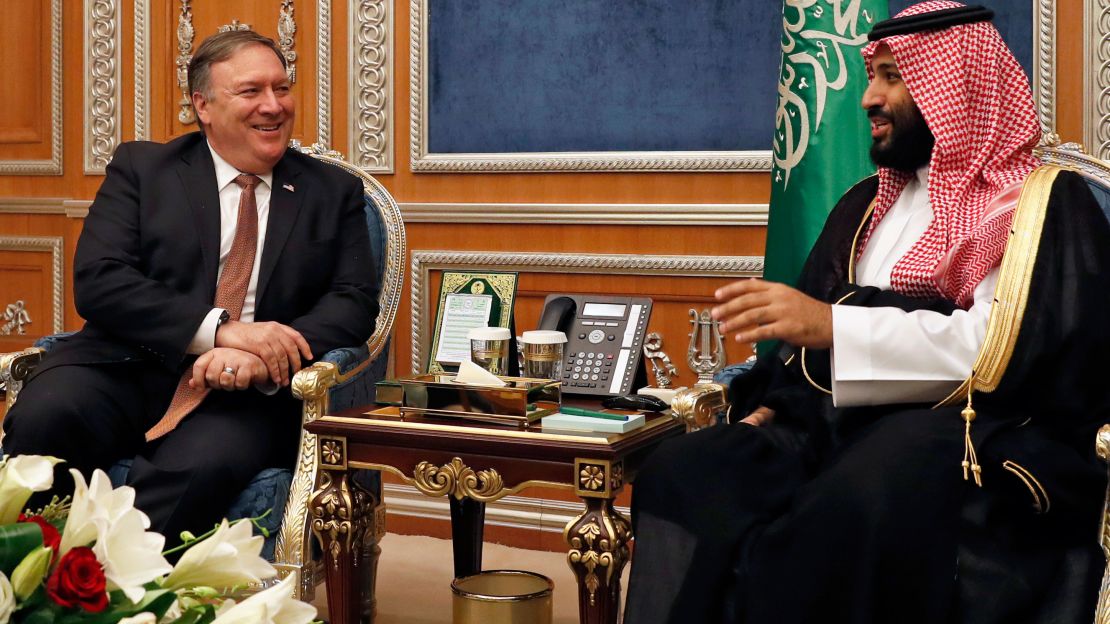Turkish investigators wearing hazmat suits searched the Saudi consul general’s residence in Istanbul on Wednesday, looking for clues to what happened to Jamal Khashoggi amid growing indications that the men allegedly responsible for the journalist’s death have close ties to the highest levels of the Saudi government.
Sources told CNN that a group of Saudi men whom Turkish officials believe to be connected to Khashoggi’s apparent killing were led by a high-ranking intelligence officer, with one source saying he was close to the inner circle of the kingdom’s Crown Prince Mohammed bin Salman.
Khashoggi, a Washington Post columnist, visited the Saudi consulate in Istanbul on October 2 to obtain papers that would have allowed him to marry his Turkish fiancée. The insider-turned-critic of the Saudi government has not been seen since.
Turkish officials have told CNN that Khashoggi’s body was dismembered after he was killed in the consulate.
Turkish investigators carried out a lengthy search of the consulate on Monday but were only allowed access to the consul general’s residence in Istanbul for the first time on Wednesday. The consul general, Mohammad al-Otaibi, left the country on Tuesday, Turkish state news agency Anadolu reported.
The search at the residence, which also involved dogs, went into the early morning hours Thursday. There was no word on whether anything was discovered.
Turkish authorities believe that 15 Saudi men who arrived in Istanbul on October 2 were connected to Khashoggi’s possible death. At least some of them appear to have high-level connections in the Saudi government.
The high-ranking officer who was close to the Crown Prince’s inner circle and led the group of men to Istanbul came from the General Intelligence Presidency, the main Saudi intelligence service, three sources familiar with the case told CNN.

One of the men under investigation by Turkish authorities is Maher Abdulaziz Mutreb, a Saudi diplomat and intelligence officer.
Mutreb is closely connected to bin Salman, a Saudi source told CNN. “He was seconded to an elite protection brigade within the Royal Guard to serve as the personal security force of [the Crown Prince],” the source told CNN.
Photographs have emerged of Mutreb with bin Salman during the Crown Prince’s tour of the United States earlier this year.
Mutreb was the first secretary at the Saudi embassy in London, according to a 2007 UK government list of foreign diplomats and a Saudi source in London who knew him and described him as a colonel in Saudi intelligence.
Turkish officials also provided CNN with passport scans of seven other men they suspect to have been part of the Saudi team. The passport scans were taken on the day of Khashoggi’s disappearance.
One of the passport scans appears to belong to Salah Muhammad al-Tubaiqi, listed as the head of forensic medicine at the Saudi Ministry of Interior.

In a 2014 interview with Asharq al-Awsat, a London-based Saudi newspaper, Tubaiqi lauded a mobile clinic designed to carry out autopsies in a record seven minutes as the first of its kind in the world. Tubaiqi, who was working as the forensic consultant and supervisor of the clinic at the time, told the newspaper it was his idea to design the clinic to allow coroners to perform forensic examinations and dissect bodies at crime and accident scenes.
Another member of the group identified by Turkish official media and appearing in the alleged passport scans is Muhammad Saad al-Zahrani, who has appeared on Saudi state TV alongside Saudi Crown Prince Mohammed bin Salman.
If that group is to be characterized by Saudi Arabia as part of a rogue operation intended to bring Khashoggi back to the kingdom alive, questions could arise about al-Tubaiqi.
A Saudi source close to the royal family told CNN that Khashoggi may have been injected with some kind of tranquilizer before his death, adding that those responsible covered up what they had done in an amateurish fashion.
But if the autopsy specialist left Saudi Arabia for Istanbul before Khashoggi entered the consulate, as Turkish sources have asserted, it might be hard to square with the explanation that any killing was the result of a botched interrogation, and not premeditated.
Several US officials have told CNN that any such operation could not have happened without the Crown Prince’s direct knowledge.
The New York Times reported Wednesday, without naming its source, that at least nine of the 15 Saudis identified by Turkish authorities as suspects in the Khashoggi case worked for the Saudi security services, military or other government ministries.
Difficult questions
Saudi officials had previously maintained Khashoggi left the consulate the same afternoon of his visit, but they provided no evidence to support the claim.
Sources have told CNN that the kingdom was preparing a report to acknowledge that Khashoggi died at the consulate in Istanbul in an interrogation that went awry. The sources said the interrogation was intended to lead to his enforced return to Saudi Arabia.
One source said the report will likely conclude that the operation was carried out without clearance and transparency and that those involved will be held responsible.
But a Saudi admission that Khashoggi died in the consulate would not deter difficult questions over the whereabouts of his remains, or the movements of the 15 men and their links to bin Salman.
Questions have also been raised by Turkish authorities over Saudi Arabia’s lack of cooperation in investigating the disappearance.
By the time Turkish investigators gained access to the consulate Monday evening, a fresh coat of paint had been applied “everywhere” inside the building, a Turkish official told CNN Tuesday. The source demanded that Saudi Arabia make “a genuine contribution” to the investigation.
Previously, a source familiar with the ongoing investigation told CNN that Turkish authorities have audio and visual evidence that showed Khashoggi was killed inside the Saudi consulate. The evidence, which was described to the source by a Western intelligence agency, showed there had been an assault and a struggle inside the consulate, along with the moment Khashoggi was killed, the source said.
President Donald Trump said Wednesday that the US has asked Turkey for a copy of the audio recording it claims to have from within the Saudi consulate, while seeming to cast doubt on whether the recording does indeed exist.
“We have asked for it, if it exists,” the President said. “I’m not sure yet that it exists. Probably does. Possibly does.”
CNN has not been able to speak to anyone who has directly heard the purported recording. Only Turkish officials appear to have had access.
Pompeo: ‘I don’t want to talk about the facts’
US Secretary of State Mike Pompeo met Wednesday with Turkish President Recep Tayyip Erdogan and Foreign Minister Mevlut Cavusoglu during a brief stop in Ankara.
Before taking off from the capital, Pompeo said he had “nothing to say” about Turkish claims that they have audio of Khashoggi’s murder. He said he discussed the Khashoggi case with Turkish officials Wednesday, and “we made clear that the Saudis had cooperated with the investigation the Turks are engaged in.”
Pompeo pushed back on the idea that the US was giving the Saudis “the benefit of the doubt,” saying it was “reasonable” to give them “a handful of days” more to complete the investigation.
The day before, Pompeo visited Saudi Arabia, where he held talks with King Salman and Crown Prince Mohammed bin Salman, who he said “strongly denied” any knowledge of what happened to Khashoggi.

Asked if the Saudi officials told him whether Khashoggi was dead or alive, Pompeo said: “I don’t want to talk about any of the facts. They didn’t want to either and that they want to have to opportunity to complete this investigation in a thorough way… I think that’s a reasonable thing to do, to give them that opportunity and then we’ll all get to judge.”
Trump also denied that he was “giving cover” to Saudi Arabia on Wednesday, insisting that he wants to get to the bottom of what happened. But he again emphasized the importance of the US’s relationship with Saudi Arabia, pointing to Saudi investments in the US.
On Tuesday, the same day Pompeo landed in Riyadh, $100 million from the Saudi government arrived in Washington for US efforts to stabilize Syria, according to a State Department official.
Trump has been reluctant to castigate the kingdom, a key US ally, despite growing pressure at home and internationally. His recent comments may be a sign that Washington is preparing to accept Saudi Arabia’s efforts to distance its leaders from whatever fate befell Khashoggi.
The crisis has also led to international firms pulling out of a high-profile summit in Riyadh this month. The CEOs of three top banks announced their withdrawal from the conference Tuesday. International Monetary Fund chief Christine Lagarde has also pulled out.
CNN’s Gul Tuysuz, Nic Robertson, Tim Lister, and Clarissa Ward reported from Istanbul. Laura Smith-Spark wrote from London and Bard Wilkinson from Hong Kong. Barbara Arvanitidis, Michael Callahan, Hamdi Alkhshali, Sarah Sirgany and Isil Sariyuce contributed to this report.







